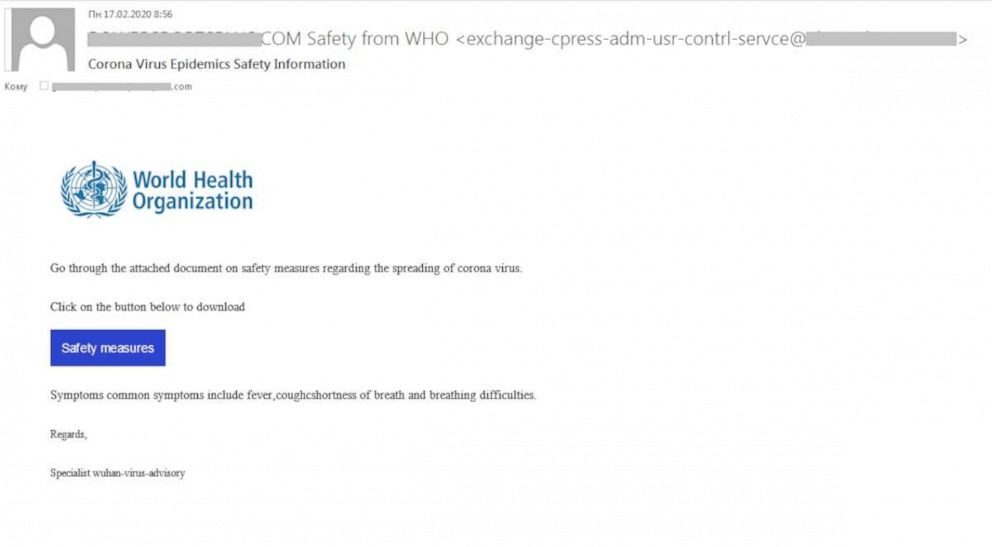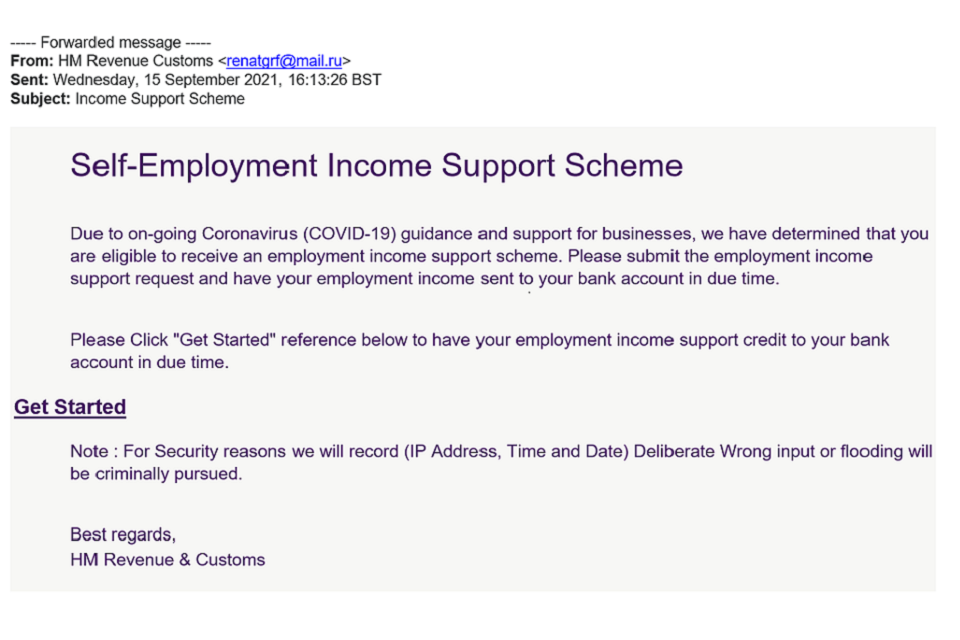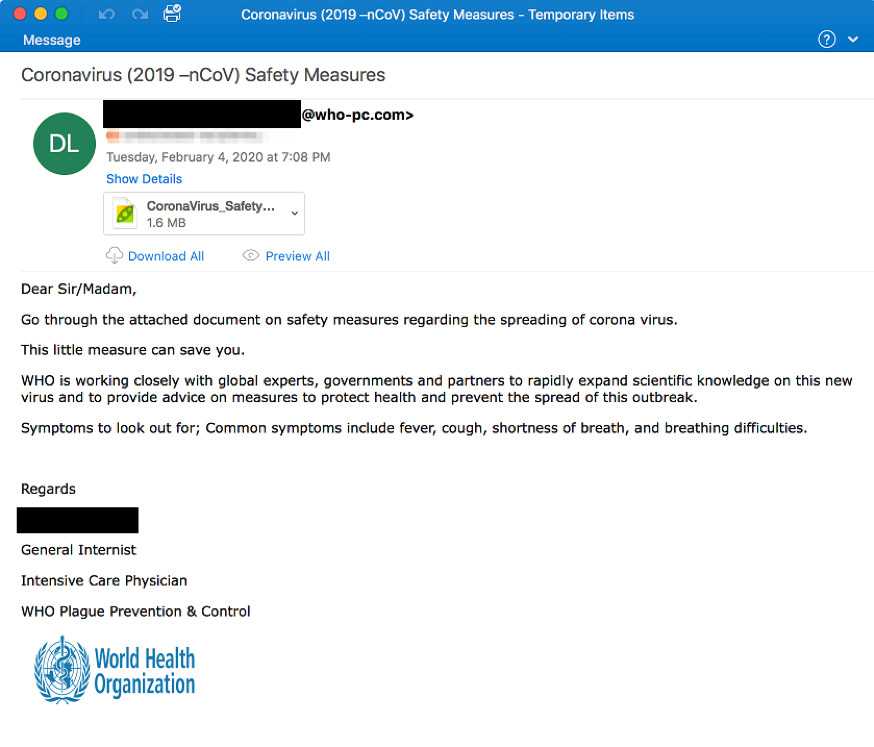
- #COVID PHISHING EMAIL EXAMPLES HOW TO#
- #COVID PHISHING EMAIL EXAMPLES UPDATE#
- #COVID PHISHING EMAIL EXAMPLES FULL#
- #COVID PHISHING EMAIL EXAMPLES PROFESSIONAL#
- #COVID PHISHING EMAIL EXAMPLES DOWNLOAD#
Tips to prevent doorstep scamsĪlways remember - Lock, Stop, Chain, Check. Good neighbour scamsĬriminals pretending to be 'good neighbours' offering to help with shopping, prescriptions etc during the crisis, taking money up front and never returning. Rogue traders offering to disinfect homes, doors, driveways etc to stop the spread of infection. Bogus home testing kitsīogus healthcare or charity workers claiming to offer 'home testing' for Coronavirus or asking for a donation to fight the virus. One person distracts the resident with a task such as completing paperwork, while the other proceeds to steal cash and valuable items from the home.

#COVID PHISHING EMAIL EXAMPLES PROFESSIONAL#
An example would be two people entering homes of residents, pretending to be a medical professional or carer or from a utility company. Doorstep scams Distraction burglariesĭistraction burglars often work in pairs.
#COVID PHISHING EMAIL EXAMPLES DOWNLOAD#
Ask you for any passwords or PINs to download softwareįull information can be found on the on the Public Health England Contact Tracing website. Ask any details about your bank account or social media. Ask you to make any form of payment or purchase a product. The team will call from 03 or send a text from "NHS". The NHS Test and Trace Service will email, telephone and text people who have been in close contact with confirmed Coronavirus cases. #COVID PHISHING EMAIL EXAMPLES HOW TO#
How to check an NHS Test and Trace contact tracer is genuine
Visit the Action Fraud website for more information about the NFIB. Visit the Safer Jobs website for more information about recruitment scams. Verify that the employer / recruiter is who they say they are by contacting the employer using information from their official website or verified social media accounts. #COVID PHISHING EMAIL EXAMPLES FULL#
Don't include personal information such as your full address, date of birth or National Insurance (NI) number on your CV or public profiles on recruitment sites. Others find out that their personal details have been used to take out loans, for which they are also now liable. Some victims are also asked to move the ‘employer’s’ money through their own bank accounts, putting them at risk of committing money laundering offences. In reality, victims will never hear from the suspects again and are left liable for the mobile phone contract they were convinced to purchase. The victim is reassured that the contract will be terminated. Once the victim has successfully taken out the contract, they are directed to drop-off points to deliver the phone and SIM card to a ‘colleague’ of the caller. The caller assures the victim that the contract will be cancelled once the recruitment process is completed. The victim is instructed to visit one of the mobile network’s high street stores and take out a phone contract using their own personal and financial details. The caller explains to the victim that they will need to take part in a “mystery shopper” test in order to pass the recruitment process. The National Fraud Intelligence Bureau (NFIB) are warning of a ‘mystery shopper recruitment scam’ which has already claimed 35 victims in London who have lost over £51,000.įraudsters are using recruitment apps and websites to target job-seekers with cold-calls claiming to be an employee of a mobile phone network. Mystery shopper scam targeting job-seekers You can forward suspicious texts to 7726. Do not give out your bank details to pay for a vaccine or to confirm your address.įor genuine COVID-19 related advice including vaccination information, visit the GOV.UK website and the NHS website. Please remember that your GP surgery or the NHS will administer your Covid vaccine free of charge. Scammers claiming to be from the NHS are also telephoning residents, instructing them to press a key to confirm they'd like to receive the vaccine or asking for bank details as affirmation to receive the vaccine. The resident is then asked to ‘confirm ownership of address’ by providing their bank details. This recent scam has seen residents being sent a text message which includes a blue link, which takes them to a fake webpage with NHS branding. Watch out for fraudulent text messages from scammers posing as the NHS, claiming to offer Coronavirus vaccines. 

Remember: Scams are fraud and fraud is crime. Please familiarise yourself with the types of scams taking place and make your families, friends and neighbours aware.

#COVID PHISHING EMAIL EXAMPLES UPDATE#
We have compiled a summary of the Coronavirus scams we are aware of and will update this page regularly. Many scams involve criminals pretending to be from a genuine organisation such as: We urge residents and businesses to be wary of scammers taking advantage of the Coronavirus pandemic.īe cautious of any unsolicited contact.








 0 kommentar(er)
0 kommentar(er)
